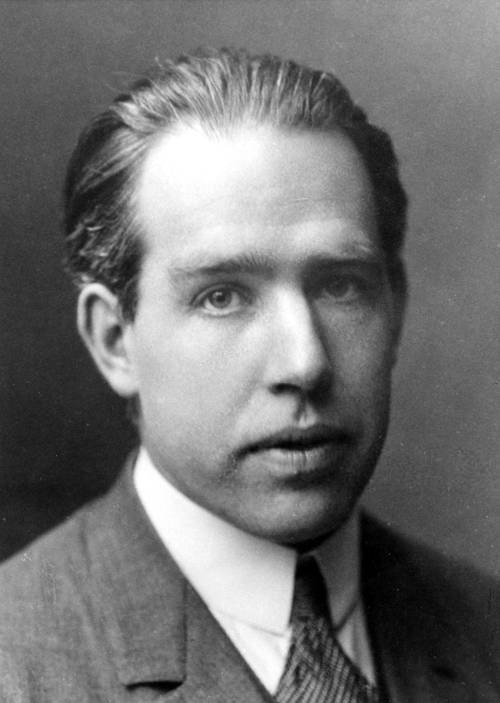
FAQ About Niels Bohr

Who was Niels Bohr?
Niels Bohr was a Danish physicist born on October 7, 1885, in Copenhagen, Denmark. He is widely recognized for his groundbreaking contributions to understanding atomic structure and quantum mechanics. His work paved the way for the development of modern physics, and he was awarded the Nobel Prize in Physics in 1922 for his research on atomic models.

What is Niels Bohr most famous for?
Niels Bohr is most famous for his Bohr model of the atom, which introduced the theory of electrons traveling in orbits around the atom's nucleus. He was also instrumental in the development of quantum mechanics and contributed significantly to the understanding of the structure of atoms. His work helped establish the principles of complementarity which are core to quantum theory.

What is the Bohr model of the atom?
The Bohr model of the atom, proposed by Niels Bohr in 1913, describes the atom as a small, positively charged nucleus surrounded by electrons that travel in circular orbits around the nucleus. Bohr introduced the idea that electrons could only occupy certain orbits or energy levels, and they emit or absorb energy when they jump from one orbit to another.

How did Niels Bohr contribute to quantum mechanics?
Niels Bohr's primary contribution to quantum mechanics includes the Bohr model of the atom and his development of the principle of complementarity. The principle of complementarity posits that objects can be described in mutually exclusive ways, like particles and waves. This concept is a fundamental part of quantum mechanics and reflects the dual nature of light and matter.

What did Niels Bohr win a Nobel Prize for?
Niels Bohr won the Nobel Prize in Physics in 1922 for his contributions to the understanding of atomic structure and quantum mechanics. His pioneering work on the structure of atoms and their radiation helped establish foundational principles in physics, such as the Bohr model and quantum theory.

Where did Niels Bohr conduct most of his research?
Niels Bohr conducted the majority of his research at the University of Copenhagen, where he also served as a professor. In 1921, he founded the Institute of Theoretical Physics, which became a leading center for research in theoretical physics throughout his career.

What is Niels Bohr's principle of complementarity?
The principle of complementarity, proposed by Niels Bohr, is the idea that objects in quantum mechanics, such as electrons, can exhibit dual characteristics. For example, they might be observed as particles or waves, but never both simultaneously. This principle is a fundamental aspect of quantum mechanics and highlights the complex nature of quantum phenomena.

Did Niels Bohr have any impact on nuclear energy?
Yes, Niels Bohr had significant influence on nuclear energy. His understanding of nuclear processes and atomic structure was integral to the development of nuclear fission. During World War II, Bohr was involved in the war effort through the Manhattan Project, although he advocated for peaceful uses of atomic energy in his later years.

How did Niels Bohr influence modern physics?
Niels Bohr's work laid the foundation for many aspects of modern physics. His model of the atom and development of quantum theory introduced concepts that refined classical theories. His ideas continue to influence research in atomic and subatomic physics, quantum mechanics, and nuclear energy. Moreover, his philosophical insights into science, such as complementarity and open exchange of knowledge, have shaped scientific thought and collaboration.

What was Niels Bohr's role in the Manhattan Project?
Niels Bohr was involved in the Manhattan Project during World War II, offering his expertise in nuclear physics. Though primarily serving as a consultant, his insights were invaluable to the development of nuclear weapons. Post-war, he advocated for the control and peaceful use of nuclear energy, stressing the ethical aspects and the need for international cooperation.

What is the atomic model proposed by Niels Bohr?
The atomic model proposed by Niels Bohr, also known as the Bohr model, suggests that electrons orbit the nucleus in fixed paths or energy levels. These orbits were proposed to have quantized energy levels, and transitions between these levels result in the emission or absorption of radiation. This model helped explain atomic spectra and laid the groundwork for modern quantum mechanics.

How did Niels Bohr explain atomic spectra?
Niels Bohr explained atomic spectra using his atomic model, where electrons occupy discrete energy levels within an atom. According to his theory, the spectra are observed when electrons transition between these levels, emitting or absorbing specific amounts of energy as photons, which manifest as light at particular wavelengths in the atomic spectrum.

What is the legacy of Niels Bohr in science?
Niels Bohr's legacy in science is vast, having shaped modern atomic theory and quantum mechanics. His contributions continue to serve as fundamental building blocks in physics education and research. Bohr's philosophies on scientific openness and international collaboration are also notable, having influenced global scientific interaction and policies concerning nuclear energy.

How did Niels Bohr's ideas challenge classical physics?
Niels Bohr's ideas challenged classical physics by introducing the concept of quantization of energy levels, which contradicted the classical understanding of continuous energy states. His work on the dual nature of electrons and photons laid the groundwork for quantum mechanics, fundamentally altering the traditional Newtonian view of the universe.

What challenges did Niels Bohr face in developing his theories?
Niels Bohr faced several challenges in developing his theories, including the prevailing acceptance of classical physics which did not account for quantum effects. His radical ideas on quantization and atomic behavior met with skepticism. Furthermore, the interpretation of quantum mechanics was itself a complex and contentious process involving intense discussion and debate among physicists.

Did Niels Bohr have any influence on later physicists?
Yes, Niels Bohr had a profound influence on later physicists. His pioneering work in quantum mechanics inspired numerous scientists, including his students and colleagues such as Werner Heisenberg and Wolfgang Pauli. Bohr's principles continue to underpin much of contemporary physics, inspiring generations of researchers exploring quantum theory and beyond.

What was Niels Bohr's educational background?
Niels Bohr studied at the University of Copenhagen, where he completed his doctorate in 1911. His education was heavily focused on physics and mathematics, and during this time, he began researching the electron theory of metals. His academic journey and connections with leading physicists of the time, like Ernest Rutherford, further shaped his scientific career.

How did Niels Bohr's views on science and society overlap?
Niels Bohr believed strongly in the open exchange of scientific knowledge and was a proponent of using science for the benefit of society. His engagement with the ethical implications of nuclear energy highlighted his commitment to ensuring science served peaceful purposes. After World War II, he advocated for international dialogue and cooperation concerning nuclear technologies.

Was Niels Bohr involved in any philosophical discussions in physics?
Yes, Niels Bohr was deeply involved in philosophical discussions about physics, particularly regarding the interpretation of quantum mechanics. His principle of complementarity is not just a scientific concept but also a philosophical one, inviting discussions on the nature of reality and observation. Bohr's philosophical outlook encouraged dialogue across sciences and humanities, influencing both scientific and philosophical thought.

Did Niels Bohr collaborate with other scientists?
Niels Bohr collaborated extensively with other scientists throughout his career. His relationships with prominent physicists such as Albert Einstein, Werner Heisenberg, and Max Planck significantly contributed to the development of quantum theory. These collaborations were marked by vibrant intellectual exchanges and helped advance the understanding of atomic and quantum physics.
